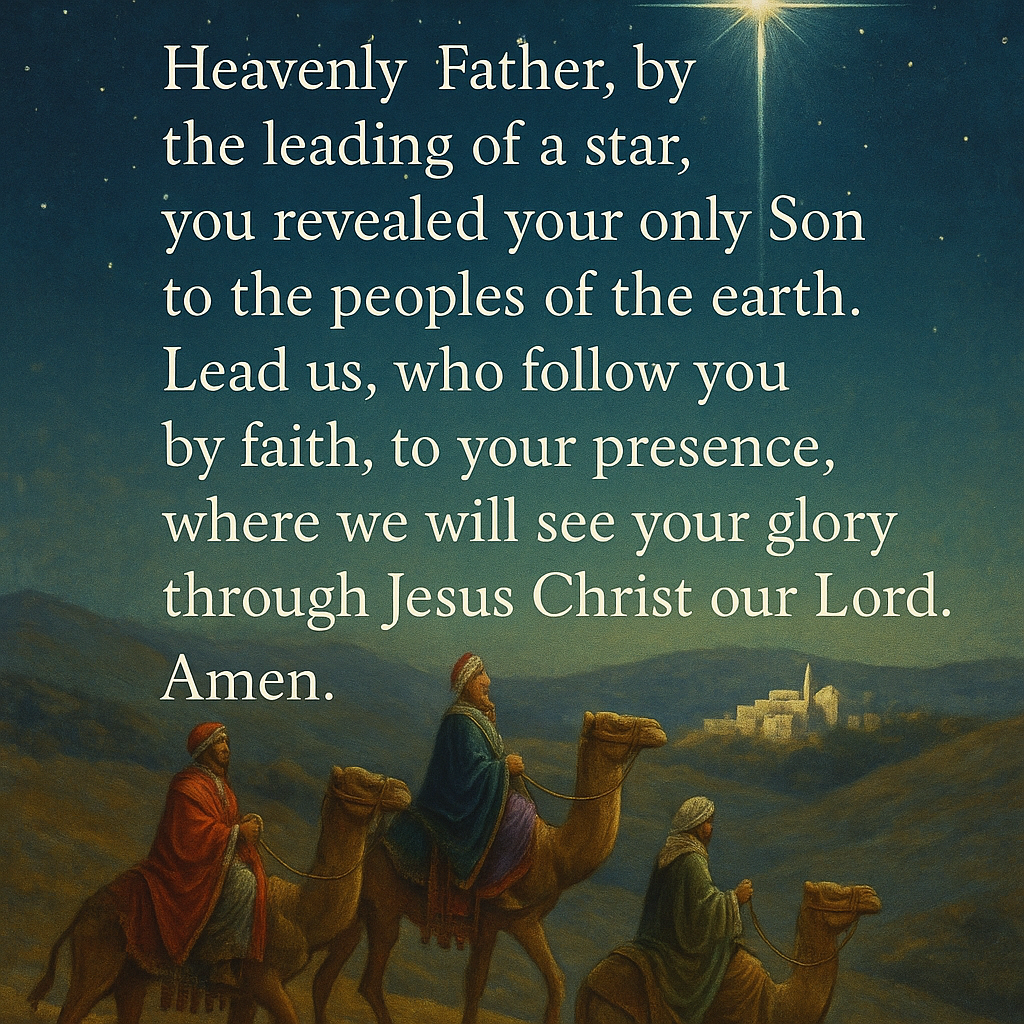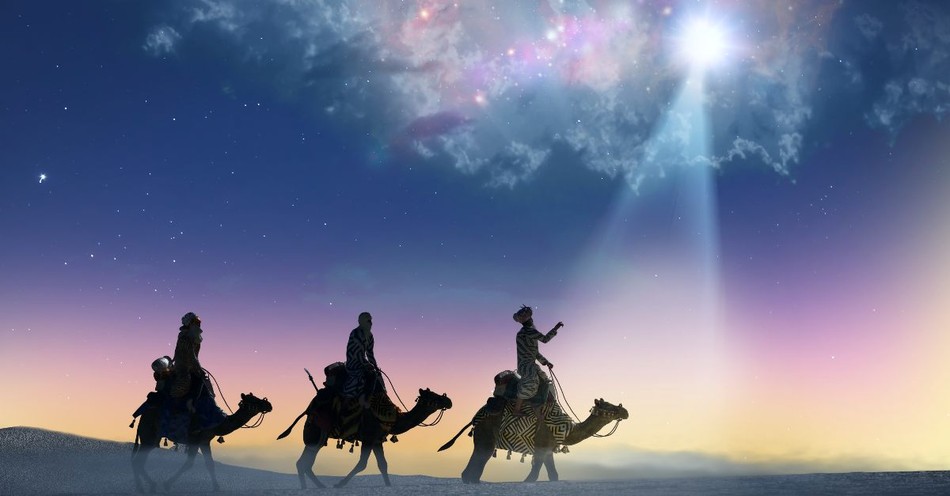When I taught seventh grade, I had a student once whose name was Epiphany.
She would walk in the classroom, and I would yell, “I have an Epiphany!” She would laugh, the first time a little awkwardly. I asked her if she knew what her name meant, and she gave me the dictionary definition, a revelation. I explained how it commonly means having an “aha!” moment, a sudden and important insight. She smiled and gave me a polite, obligatory laugh every time I would say, “I have an Epiphany!” when she walked into the room. Which might have been every day.
But epiphany has another meaning. In certain Christian circles, Epiphany, or Three Kings Day, refers to a specific religious event, a day observed on the calendar. Many outside of liturgical churches may not know the depth and origins of this special holiday which is connected with Christmas and so much more.
What Is the Significance of Epiphany?
Epiphany is a Christian feast celebrating the revelation of Jesus Christ to the world. The word “epiphany” comes from the Greek epiphaneia, meaning appearance or manifestation. The religious event, Epiphany, observes the time when Jesus was made known as God’s Son, specifically to the Gentiles. It is connected to the Magi’s visit from the East. Christians use the day to celebrate how Jesus came not just for Israel but for all nations.
Epiphany happens on January 6, following the 12 days of Christmas. In many church calendars, January 6 closes out the Christmas season and begins the Epiphany season, which lasts until the beginning of Lent. The Western Church will focus on the wise men and their account in Matthew 2:1-12. Eastern traditions emphasize Jesus’ baptism in the Jordan River as the time when the Father reveals Jesus as his Son (Matthew 3:13-17).
Christians observe Epiphany to honor God’s faithfulness in revealing Christ to the world. The wise men followed a celestial phenomenon, a star, which God used to lead them to Jesus. Their gifts (gold, frankincense, and myrrh) symbolized Jesus’ kingship, priesthood, and sacrifice. The Old Testament connects the coming Messiah to a worldwide kingdom and message, and the Magi’s gifts become symbols to remind everyone how Jesus came to bring salvation to all people.
Regarding Jesus’ baptism, the Father audibly affirmed Jesus as his Son, in whom he was well-pleased. John the Baptist baptized Christ, and he also declared Jesus’ identity. “Behold! The Lamb of God who takes away the sin of the world!” (John 1:29)
Epiphany reminds us how God reveals himself to everyone. The religious elite or a chosen nation no longer have special positions. The Father engages with seekers from every background. The yearly observance calls Christians to respond with worship and witness, to declare the Good News of Jesus, the Light of the World, coming for all people.
What Are the Origins and History of Epiphany?
Epiphany traces back to the early Church during the second and third centuries. Originally, Christians in the East celebrated Epiphany as a combined feast of Jesus’ birth, the Magi's visit, Christ’s baptism, and even his first miracle (changing water into wine at Cana). These collected events reveal Jesus as the Son of God, as divine, so the early believers grouped them under one celebration of “revelation.”
The first Christians were primarily Jewish, and they had their own holidays and feasts, often redefining them when they came to Christ, seeing them in light of the Messiah. By the beginning of the second century, most Christians were Gentiles, and they started to develop their own traditions and holidays along with and separate from the Jewish background.
By the fourth century, the Western Church started to develop their own liturgical calendar, in which the celebration of Jesus’ birth happened on December 25. So the Westerners made Epiphany the observance of the Magi searching for and finding Jesus. Since the Eastern Church didn’t change their calendar, they maintained the focus on Christ’s baptism as a theophany, a visible appearance of God in the world.
Epiphany became one of the earliest Christian feast days, along with Easter and Pentecost. The Church’s celebration on January 6 countered other popular pagan festivals associated with the winter solstice. Over time, like Christmas, Epiphany symbolized Jesus as the true Light breaking into the darkness of the world. In the Middle Ages, Epiphany grew in significance. Medieval Christians would hold pageants or plays to reenact the wise men and their visit. They created customs like the “King Cake” and home blessings, which still continue today.
How Do Different Denominations Celebrate Epiphany?
While many groups celebrate Epiphany, the expressions are diverse and varied.
The Roman Catholic Church observes Epiphany as a major feast day on January 6. However, some countries move Epiphany to the Sunday following January 6, if it falls during the week. The Church recounts the visit of the Magi as a sign of Christ’s revelation to the Gentiles. Catholics will attend special Masses to focus on the Gospel reading from Matthew 2, and many participate in the traditional home blessings. This usually includes marking doorways with a chalk inscription: 20+C+M+B+year. This symbolizes the traditional names of the Magi (Caspar, Melchior, and Balthasar). Along with this chalk writing, people write the Latin blessing Christis mansionem benedicat (May Christ bless this house).
Eastern Orthodox Churches celebrate Epiphany on January 6 or 19, depending on whether they use the Gregorian or Julian calendar. Focusing on Jesus' baptism instead of his birth, they refer to it as Theophany, meaning “appearance of God.” The Theophany includes the Great Blessing of the Waters, where priests bless rivers, lakes, or other containers of water to show Christ’s sanctification of creation and his deliverance from death. The Christian baptism is connected to God creating or delivering from the chaos of water (Creation in Genesis 1:1-2; Parting the Red Sea in Exodus 14:21-22; Parting the Jordan River in Joshua 3:15-17). In some places, clergy throw a cross into a body of water, and young men dive in to retrieve it as a sign of faith.
Anglicans, Methodists, Lutherans, and similar liturgical Protestant denominations come from the Catholic tradition, so they observe Epiphany with worship services that focus on the Magi’s visit, working in the wider theme of Christ being revealed to the nations. Many make the natural connection of Epiphany with global missions and evangelism. Some traditions spread out the celebration into a whole Epiphany season lasting several weeks to also include the baptism and the first miracle at the wedding in Cana, bringing in the Orthodox ideas.
Latin America and Spanish cultures have developed Dia de los Reyes (Three Kings’ Day) as a feast day, especially for kids who receive gifts in honor of the Magi’s offerings. Families even bake and share “Rosca de Reyes,” a sweet bread with a hidden figure representing the baby Jesus.
What Are Scripture Readings and Prayers for Epiphany?
Matthew 2:1-12 becomes the main passage for Epiphany in the Western Church. These verses record how these academics and astrologers from the east recognize a special star and follow it to find a newborn, Jewish king. The story implies the Magi recognized the Messianic nature to the time and birth. Old Testament prophets revealed how people from all nations, not just the Jews, would come from around the world to worship God in Jerusalem (Isaiah 2:2-3, Micah 4:1-2, Zechariah 8:22-23, and more). Matthew includes the story of the Magi to show how Jesus revealed these prophecies as a child.
Isaiah 60:1-6 predicts the coming of light to darkness and the gathering of all nations to God’s presence. “Arise, shine, for your light has come, and the glory of the Lord rises upon you.” This passage also mentions kings bringing gold and frankincense, echoed in the wise men’s visit. Psalm 72:1-11 offers a prayer for the Messiah to reign, asking that kings from distant lands would bow before the King of Israel.
For the more Eastern traditions, Matthew 3:13-17 and John 1:29-34 are great readings to use during Theophany, as these passages describe Jesus’ baptism and the Father’s words from heaven, “This is my beloved Son.”

Regarding prayers, churches and believers can use prayers of thanks and devotion during Epiphany.
Here is one possible prayer:
Heavenly Father, by the leading of a star, you revealed your only Son to the peoples of the earth. Lead us, who follow you by faith, to your presence, where we will see your glory through Jesus Christ our Lord. Amen.
Or another could be:
Almighty God, who revealed your Son to the wise men and brought light to the nations, please shine in our hearts and guide our steps, that we might also worship Christ in Spirit and truth. Amen.
What Does Epiphany Mean for Christians Today?
Essentially, we can only know God through his self-revelation to us. The Fall of Adam and Eve, bringing in the sin nature, making our hearts rebellious, resulted in a gap between humanity and God that we couldn’t bridge or cross. Only God could. And in his mercy and love, he did. The Lord Jesus Christ, his Son, becomes the greatest revelation of God to the world. “If you’ve seen me, you’ve seen the Father,” Jesus said. (John 14:9).
We see Christ first revealed in the Old Testament through prophecies and promises pointing to a coming Messiah. From Genesis to Malachi, God declared through symbols, covenants, the sacrifices, and promises how he would send a Savior, a divine king/priest to establish and sustain an eternal kingdom. Isaiah foretold a light for the Gentiles (Isaiah 42:6). Micah talked about a ruler being born in Bethlehem (Micah 5:2). Jesus fulfills the whole Old Testament (John 5:39-40).
At Christmas, we celebrate the Incarnation, Jesus as Immanuel (God with us), God made visible in the flesh. Epiphany goes further, however, showing how Jesus came not only for Israel but to the world, recognized symbolically and literally through the Magi. This fulfills God’s promise to Abraham to bless all nations through his “seed.” (Genesis 12:3).
In the gospels, we see Jesus continually revealing his identity as God, Savior, King, Priest, and Son: through his baptism, miracles, teaching, and ultimately his death and resurrection. The gospel writers intentionally shared these specific accounts to declare Jesus as the Son of God, the Lamb who takes away the sin of the world, the resurrection and the life.
Jesus was baptized not only with water but also with the Holy Spirit. We enjoy the same dual baptisms as disciples of Christ, upon our repentance and belief. The Spirit now reveals Christ, opening our eyes to see the truth and believe the Gospel. The Spirit guides us into all truth, testifies of Jesus, reminds us of all his teaching, and transforms us into God’s likeness. Through the Spirit, we share the light of Christ with a world in darkness.
There will be a future revelation of Christ, too. Epiphany points forward to Christ’s second coming, when he will be fully and finally revealed openly as the King of Kings and Lord of Lords. “Every eye will see him,” Revelation 1:7. His glory will cover the earth.
Epiphany calls us to worship God for his revelatory work, share in the witness, and wait for his future glory. Christ has come, is present through his Spirit, and will come again.
Peace.
Read More about Epiphany:
Is Epiphany Three Kings Day a Biblical Holiday?
What Is the Meaning of Epiphany?
Three Gifts from the Magi to Jesus: Scripture and Meaning
What The Wise Men Teach Us About Worship and Generosity
What Is the Significance of Epiphany?
Three Kings Day Traditions History and Meaning
Photo Credit: ©iStock/Getty Images Plus/Denis-Art




